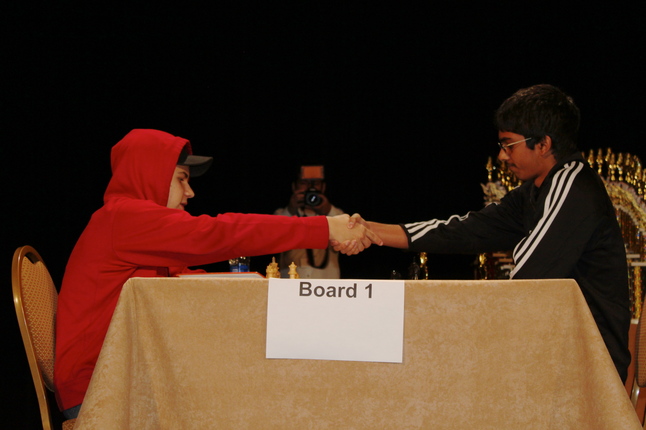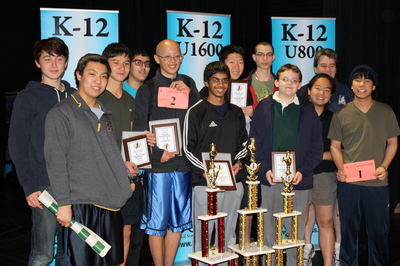
Huron High School junior Atulya Shetty, right, shakes hands with his opponent before his final game of the SuperNationals chess tournament in Nashville April 5-7. Shetty was crowed the K-12 national champion at the tournament.
Courtesy of Atulya Shetty
The 11 students carpooled to Nashville April 5-7 to compete with thousands of students in grades K-12 in the United States Chess Federation’s SuperNationals tournament.
After three days of competition and seven games of chess, Shetty was named the K-12 SuperNationals champion, clinching the first-place trophy for individual play and a $2,000 scholarship. The Huron High School team took second place in the K-12 championship division, the highest division at the event. A team from Edward R. Murrow High School in New York was the overall team champion.
Five students from Huron competed in the K-12 championship division. They were Shetty, sophomores Alexander Deatrick and Jeffery Zhang and freshmen Justin Chen and Marco Lorenzon. The four best individual scores were totaled to determine the overall team score.

The Huron High School chess club took second place in the national tournament during spring break.
Courtesy of Atulya Shetty
The five other lower-division players from Huron were Adam Abu-Shtayyah, Franklin Bromberg, Andy Hsiao, Hao Tang and Valerie Peng.
"I am very, very proud of them," said Huron chess coach Ken Long. "Atulya (Shetty) is the best player I have ever had the acquaintance of. ... He's just a true genius. But not only is he a great kid with chess, he's a great leader and a great student who's also had tremendous success academically."
Long said Shetty and the Huron chess club also volunteer their time at Mitchell Elementary School running a chess program there.
Shetty began playing chess when he was about 4 1/2 years old. He said it was his two preschool teachers who sparked his interest in the game and first taught him to play. Unlike many chess prodigies, the strategy game was not a skill passed down through his family.
"I think people usually learn from their parents or grandparents. A love of chess seems to run in families," Shetty said. "If it weren't for those teachers, I probably would have learned from my dad (who plays chess casually) at some point ... but I might not have been as serious with the game."
Shetty also is the No. 1 player in Michigan across all age groups, including those who are his elders. Shetty said the one thing he enjoys most about chess is it never gets old.
"You are never done learning," he said. "There is always something you can get better at ... You find a new weakness you have to improve and then you start slipping in old weaknesses ... it's always a challenge."
Despite popular misconceptions, chess is akin to a varsity sport in the amount of practice and preparation needed before a competition, Long said.
In the weeks before the SuperNationals, Shetty said he did a variety of "chess puzzles" to keep his mind active and alert. The puzzles involve trying to get out of check and other sticky situations in check.
During a game, the Huron chess players take notations of what moves they make in order to review the moves after the match to determine what mistakes were made and what they can do better next time. Shetty said there also are databases to look up one's opponent and see what opening moves and plays they make most frequently, similar to reviewing tape before a football or basketball contest.
It was Long's first trip to the national chess tournament and he described the event as very exciting with a lot of energy. He said going into the seventh round, the team buckled down.
"It was really intense," he said. "We knew we had a chance at first place, so everybody played really tight and made their best moves."
The event drew more than 5,300 participants from 44 states, the District of Columbia, Puerto Rico and an overseas military base.
"It's awe-inspiring being in a massive convention center with that many people," Deatrick said. "And you all share the same interest, so you've got something in common with everyone and can make a lot of friends."
Long said the great thing about chess is it's a game of opportunity. It also teaches children about consequences, the benefit of thinking things through in advance and how that sometimes in life, you have to make sacrifices, he said.
"Chess doesn't care about your age, ethnic background, religion, who your grandpa is, your athletic ability — anybody can win games in chess. Anybody can study chess and become successful ... and studies have shown brain games help sharpen mental skills."
Danielle Arndt covers K-12 education for AnnArbor.com. Follow her on Twitter @DanielleArndt or email her at daniellearndt@annarbor.com.